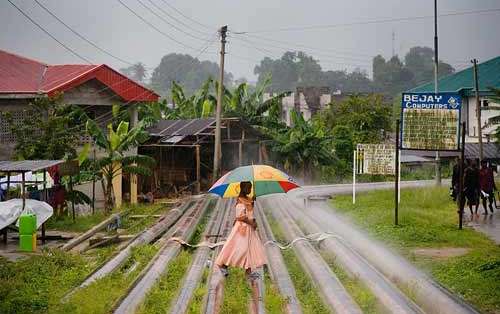Carrying a beach ball-colored umbrella branded with Shell's logo, a little girl steps across oil pipelines as she walks through her village of Okrika, Nigeria. Her nonchalance conveys just how much the petroleum company's operations have had an impact on community life.
Photographer Ed Kashi captured images like this as part of his new book, "Curse of the Black Gold: 50 Years of Oil in the Niger Delta." His photos were on display last week at John Hopkins University as part of a panel discussion of a new report assessing US and international efforts to overcome the "resource curse." The report, which is based on months of research in the field by the Senate Committee on Foreign Relations committee staff, explores the paradox where countries rich is natural resources become poorer once they are extracted.
Oxfam's Ian Gary, Senior Policy Advisor for Extractive Industries, spoke as part of the panel, describing how African countries like Chad have been unable to translate their oil reserves into revenue that reduces poverty by building health clinics, schools, roads, and other infrastructure.
"Despite the promises, little money has trickled down to villagers near the oil field in southern Chad and fighting in February between rebels and the government decimated the capital, forcing tens of thousands to flee, including many civil society activists who had sought to hold the government accountable in the spending of oil wealth," Gary said.
So, what's the solution? Panelist Michael V. Phelan, a professional staff member of the Senate Committee on Foreign Relations, said that he believes it is important for citizens to know their rights and responsibilities and to exercise those to hold their government's accountable. During the course of their research, the Senate staff members found problems in many countries where Oxfam America is working, including Peru, Ghana and Cambodia, and consulted Oxfam field staff and partners in these and other countries.
Oxfam is working to require oil, gas, and mining companies to consult with local communities, and share information with them about their revenues and operations. One vehicle for this is the Extractive Industries Transparency Disclosure Act, legislation that is expected to be introduced in the next session of Congress that requires oil, gas, and mining companies to publicly disclose how much they pay governments to use their natural resources.
Full disclosure is important because companies and governments often keep their revenues a secret, which leads to financial mismanagement and corruption. When local people know more about the oil, gas and mining projects taking place in their backyards, they can claim their fair share for community needs—like education, health care, and jobs.



